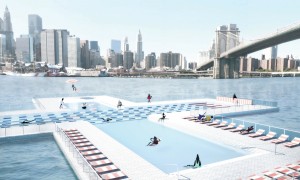Share This
Related Posts
Tags
Water + Trash
By Anca Gagiuc on May 5, 2014 in News
New York City has more miles of waterfront than Seattle, San Francisco, Chicago, and Portland combined. In fact, the City’s stature grew directly from its connection to the water, but at times throughout its history, the citizens turned their back on the waterfront, both literally and figuratively.
That is about to change. Under Mayor Bloomberg’s lead, the Vision 2020 plan was unveiled, a sustainable blueprint for the City’s waterfront and waterways. Water is actually New York’s Sixth Borough, and by giving it much deserved attention, new transportation routes, recreation and education opportunities will be produced.
NYC-based firm PRESENT Architecture came up with a preliminary plan that would help execute Vision 2020. The Green Loop project reveals a solution to the curbing pollution, while also adding to the public space – NYC has less open space than almost every major city in the country. The average New Yorker generates about three pounds of trash every day, which adds up to more than 14 million tons of trash every year. Currently, all of it is sent to landfills outside the city, racking up more than $300 million on transportation costs. Not to mention that when waste is landfilled, it rots and creates even more greenhouse gas emissions. “It’s a big, dirty problem” as they put it.
However, one third of this trash is food waste that can be transformed into compostable material and make of it ten “compost islands” around each of the five boroughs. The Green Loop is made out of multi-layered tipping and composting stations that can hold on top elevated recreational parks, educational facilities, and even cross-country skiing in the winter.
Their proposal aims to create 125 acres of public park land made completely out of organic waste. The smell issue is also taken care of through the loops themselves, which hide underneath the green, relaxing parks, real industrial processing facilities. Moreover, the project resolves the “borough equity” issue by having a composting hub in each borough, making each responsible for processing its own waste instead of sending the city’s trash to too few boroughs. The project would also create jobs, not only during the construction phase, but also afterwards for maintenance and operations.
The Green Loop tunes nicely with another project that fits in the Vision 2020 plan: Plus Pool Project, an initiative to build a floating pool that filters river water off the shores of NYC. The 164-foot +POOL is designed as the largest publicly and privately funded civic project to date, based on a crowdfunding method that offers backers the opportunity to purchase a +POOL tile that will eventually become part of the project’s final structure. In total, the pool needs to sell 70,000 tiles to reach its $15 million goal. This Olympic-size pool kills two birds with one stone: it cleans the river water and gives New Yorkers a place to swim.
The filtration system is quite unique, scrubbing the water as it floats through it, while its plus-sign shape separates different wings for different activities: Children’s Pool, Sports Pool, Lap Pool, and Lounge Pool.
So far the project has raised funds through Kickstarter and the funding team, reaching so far a total of $344,142. +POOL is scheduled to float on the waters between Brooklyn and Manhattan in the summer of 2016.

